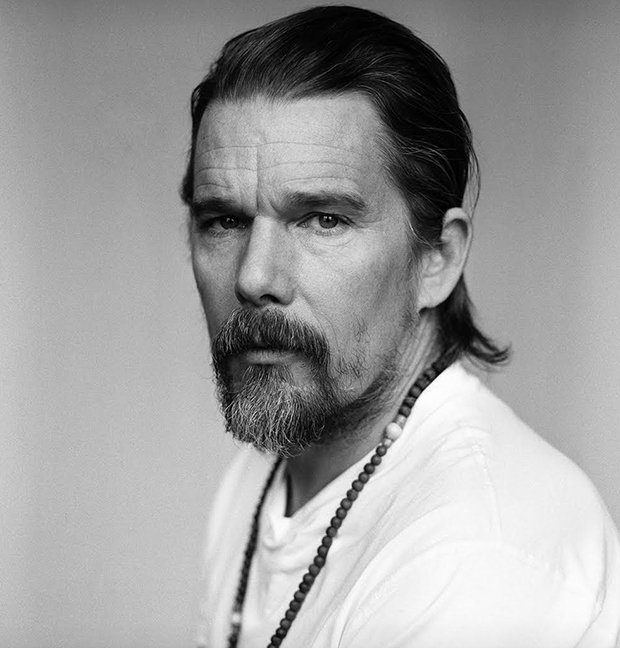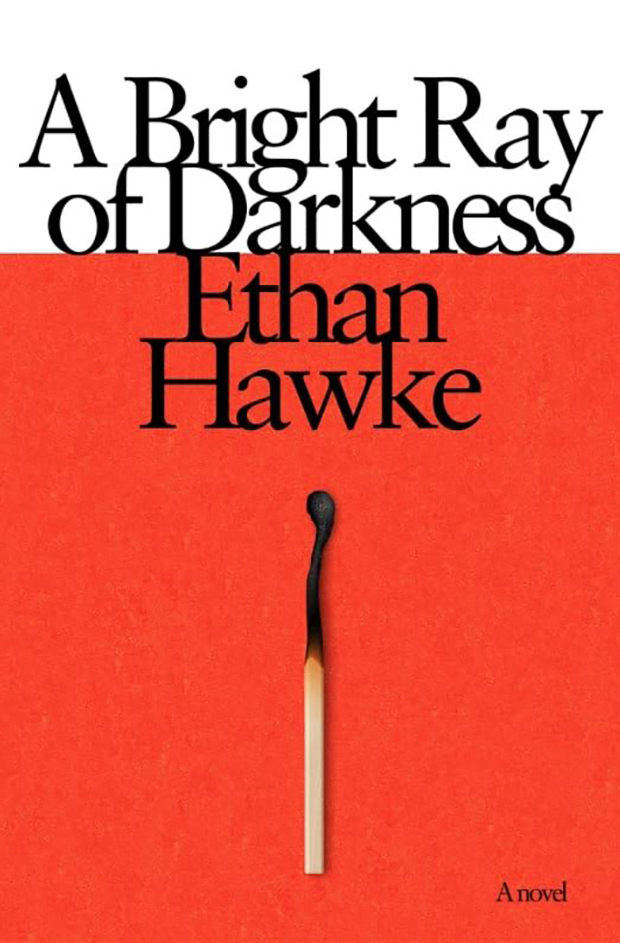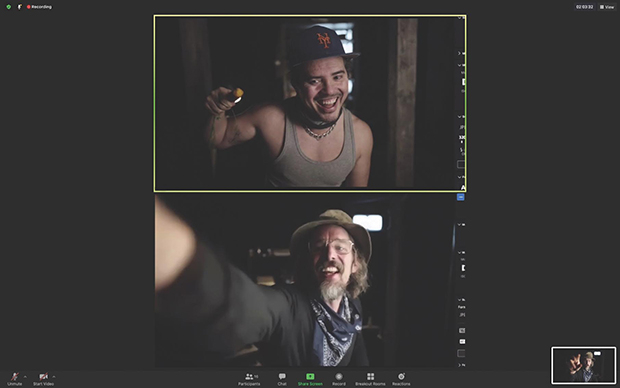Interview: Ethan Hawke Showcases His Love of Theater in A Bright Ray of Darkness and Godot
Hawke discusses his new theater-themed novel, and the New Group’s upcoming virtual production of the Beckett classic.
If you were to mistake Ethan Hawke's new novel, A Bright Ray of Darkness, he probably wouldn't be surprised. With everything that Hawke has written, readers have always seen versions of him in the protagonists. But it's even easier to make that mistake in Darkness, a novel about a young actor playing Hotspur in a starry production of Shakespeare's Henry IV. Hawke did play that role before, with a to-die-for cast that also included Kevin Kline, Richard Easton, and Audra McDonald.
Hawke, as fans of his work know, is a theater animal, and the novel really showcases a deep love for the medium. So too does his latest theatrical project, a screen adaptation of Beckett's Waiting for Godot produced by his off-Broadway home, the New Group. Directed by Scott Elliott and co-starring John Leguizamo, Tarik Trotter, and Wallace Shawn, the virtual production begins streaming today, May 6. Here, Hawke discusses both projects, which capture the essence of what he's missed most over the last year.
Get tickets for Waiting for Godot here.
Buy A Bright Ray of Darkness here.

(© Brigitte Lacombe)
This conversation has been condensed and edited for clarity.
It was fun to read the book and peer into what I imagine is a fictionalized version of your experience doing Henry IV and your life around that time. But how tired are you of getting the question 'Is this a memoir?'
One of the problems with being a famous actor trying to write is that you can't make a first impression. People have all these preconceived notions about who you are. I came across a review of the book the other day that said they weren't sure if I did a good job of separating the character from myself, and what I thought was so funny about that was that they were assuming they know me.
As a writer, I have all these strange alter egos I've created and it's very hard for people to separate them. One of them is Jesse in the Before trilogy. When I wrote Ash Wednesday, Jimmy became another alter ego. He's this huge guy who's in the military and going through this crisis, but everybody still saw it as Ethan Hawke. I had a really interesting experience when I was doing the press tour for Ash Wednesday. I met this really brilliant German editor, and I was telling him that people have no problems if an actor writes a movie, but if they write fiction, if you're not writing for other actors, people seem to have this big dilemma with it.
So I was saying that I think I shouldn't write fiction anymore, and he said that I really should write about acting, because it's the one thing I might have to offer. Don DeLillo would need 30 years of experience and research to try and write about the theater, but if you could take what you've learned and try to write a substantive novel about your profession, it would be of value. That sentence kind of hung in my brain for a while. If all you're going to do is see me, I might as well make William Harding [in A Bright Ray of Darkness] an actor. My joke all the time was that I was going to try to do for the actor what Melville did for the whaler.
Even though it isn't autobiographical, I did enjoy placing the Henry actors into this, like the great Richard Easton, who I know was a mentor of yours.
Richard Easton is such a hero of mine. I did Coast of Utopia with Richard. I did Henry with Richard. I did Cherry Orchard with Richard. In a lot of ways, that King character is based on Richard. That's my kiss farewell to Richard Easton. But I tried very hard at different points in writing this novel to change it to a play that I hadn't been in, because in no way is this meant to be a memoir of that production. It's like 30 years of experience doing plays, and I kind of threw them all into a tornado. I realized I'm not a deft enough writer to write about a play that I didn't know well. I needed to write about a play I had an intimate relationship with. I tried to make it King Lear for a while, but the themes didn't intersect with what I was trying to do with the character.
We've all seen so many entertainment depictions of theater done by people who don't really know how theater works, but I read this book and I knew that rehearsal hall. I knew those streets.
I don't like giving away the secrets of our trade and stuff like that, I just felt compelled to write about acting. I think if somebody else were to write this book, I would have told them not to. Birdman is an excellent film, but there were so many things that would never happen. Opening night doesn't work that way. That's not what rehearsals are like. Was it a good piece of cinema? Definitely. But was it an accurate depiction of stage life? Not at all. I felt like a doctor watching E.R. That's not the way they would do that. And that kind of propelled me to write this book, too.

Speaking of making theater, how did the New Group's virtual Waiting for Godot come about?
We started last summer and filmed it in February. We began the process thinking about doing a benefit reading of the play. When we rehearsed it, there was something electric about the alienation that those characters feel, and the fear and paranoia and the search for meaning. I always loved the play, but it seemed like an intellectual, existential exercise. But over Zoom, it was so new and fresh. It felt desperate and pleading. This desire we all have to connect with each other really fed into Vladimir and Estragon. They don't know what day it is. They don't know what they're waiting for. They don't know whether anything's going to ever change. All these lines felt immediate in a way they never had before.
Scott Elliott said, "Hey, what if we didn't do a benefit reading, what if we performed it?" And I remember Leguizamo saying, "You mean, memorize it?" But we all kind of got into the idea, which started slow and built and built and built. We started rehearsing it, and then Derek McLane watched rehearsal and was like, "I want to build a set." I had Covid and my wife had Covid and this giant set arrived at our house that we had to build in my son's room. Leguizamo built his in a hotel room in London. Tarik built his in his recording studio. Wally built his in his apartment, and then, before we knew it, there were real cameras in our house, and I'm having to reload in between takes.
This whole thing is delightful to hear. Not the Covid part, but that they shipped all this stuff to your house for you to put together.
It was really cool. And I've been a fan of John Leguizamo since I first saw him in the early '90s. He's one of our country's finest artists and he's a brilliant mind. He's come to see my plays and I go to see his, and he and I have always wanted to work together. And it was so hard. My memorization skills were shot. This play was so difficult. We would have to call each other up and Zoom-run lines.
Probably not as hard as it was for Wallace Shawn to memorize all the pages of the Lucky monologue.
Let me tell you something. If I ended up having to pick, like, reasons to live, one of them is to watch Wallace Shawn do the Lucky monologue from Waiting for Godot. He worked so hard on it. It wasn't hard for him to do it. He felt like it was an honor, and it's just staggeringly brilliant. His advice and counsel during this whole endeavor was priceless, and I know Tarik and John also felt that way. Watching him deliver that monologue was one of the highlights of my acting life. So if you're bored with the show, just skip to that part.
When people hear about it, they think it's just a Zoom reading, but it's not. It's the best theatrical response to the pandemic that this group of people could come up with. And I think that the play will be seen in a different way and heard in a different way than you ever have before. I don't want to look at anything on Zoom either. We're all fried from it. But I think that this piece somehow speaks to that frying.
I think the book does, in a way, too. Not that it was written during Covid, but it's just so nice to read it and feel like I'm back in a room watching people act.
In a way, both of them represent the same idea, which is my love of the theater. People don't know that it's my life's blood, and I've missed that so badly this year. I miss all those opening-night parties I used to dread, and now I would die to go to one of them. I miss seeing all the people, that whole community. I miss that being a part of all of our lives.
Get tickets for Waiting for Godot here.
Buy A Bright Ray of Darkness here.

(© Kramer Morgenthau)







